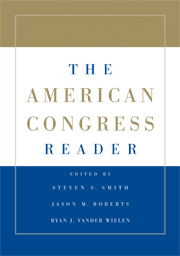Book contents
- Frontmatter
- Contents
- THE AMERICAN CONGRESS READER
- PART I THE AMERICAN CONGRESS: MODERN TRENDS
- PART II REPRESENTATION AND LAWMAKING IN CONGRESS: THE CONSTITUTIONAL AND HISTORICAL CONTEXT
- PART III CONGRESSIONAL ELECTIONS AND POLICY ALIGNMENTS
- 8 Elbridge Gerry's Salamander
- 9 Strategic Politicians and the Dynamics of U.S. House Elections, 1946–1986
- 10 Congress
- PART IV MEMBERS, GOALS, RESOURCES, AND STRATEGIES
- PART V PARTIES AND LEADERS
- PART VI THE STANDING COMMITTEES
- PART VII THE RULES OF THE LEGISLATIVE GAME
- PART VIII THE FLOOR AND VOTING
- PART IX CONGRESS AND THE PRESIDENT
- PART X CONGRESS AND THE COURTS
- PART XI CONGRESS, LOBBYISTS, AND INTEREST GROUPS
- PART XII CONGRESS AND BUDGET POLITICS
- PART XIII FURTHER READINGS ON CONGRESSIONAL POLITICS
- References
10 - Congress
The Electoral Connection
Published online by Cambridge University Press: 05 June 2012
- Frontmatter
- Contents
- THE AMERICAN CONGRESS READER
- PART I THE AMERICAN CONGRESS: MODERN TRENDS
- PART II REPRESENTATION AND LAWMAKING IN CONGRESS: THE CONSTITUTIONAL AND HISTORICAL CONTEXT
- PART III CONGRESSIONAL ELECTIONS AND POLICY ALIGNMENTS
- 8 Elbridge Gerry's Salamander
- 9 Strategic Politicians and the Dynamics of U.S. House Elections, 1946–1986
- 10 Congress
- PART IV MEMBERS, GOALS, RESOURCES, AND STRATEGIES
- PART V PARTIES AND LEADERS
- PART VI THE STANDING COMMITTEES
- PART VII THE RULES OF THE LEGISLATIVE GAME
- PART VIII THE FLOOR AND VOTING
- PART IX CONGRESS AND THE PRESIDENT
- PART X CONGRESS AND THE COURTS
- PART XI CONGRESS, LOBBYISTS, AND INTEREST GROUPS
- PART XII CONGRESS AND BUDGET POLITICS
- PART XIII FURTHER READINGS ON CONGRESSIONAL POLITICS
- References
Summary
In this classic work, Mayhew argues that much of the behavior we observe from members of Congress can be explained by the fact that they are required to win reelection in order to retain their office. Viewing members as “single-minded seekers of reelection” leaves little about the individual and collective efforts of Congress unexplained.
The discussion to come will hinge on the assumption that U.S. congressmen are interested in getting reelected – indeed, in their role here as abstractions, interested in nothing else. Any such assumption necessarily does some violence to the facts, so it is important at the outset to root this one as firmly as possible in reality. A number of questions about that reality immediately arise.
First, is it true that the United States Congress is a place where members wish to stay once they get there? Clearly there are representative assemblies that do not hold their members for very long.
Yet in the modern Congress the “congressional career” is unmistakably upon us. Turnover figures show that over the past century increasing proportions of members in any given Congress have been holdovers from previous Congresses – members who have both sought reelection and won it. Membership turnover noticeably declined among southern senators as early as the 1850s, among senators generally just after the Civil War. The House followed close behind, with turnover dipping in the late nineteenth century and continuing to decline throughout the twentieth.
- Type
- Chapter
- Information
- The American Congress Reader , pp. 126 - 138Publisher: Cambridge University PressPrint publication year: 2008
References
- 2
- Cited by



